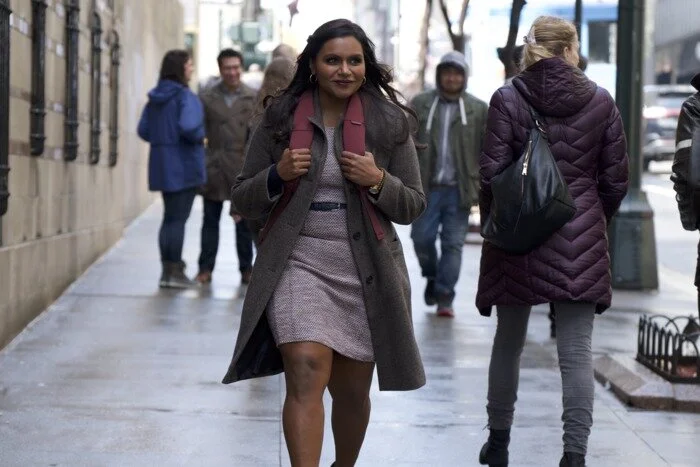'Late Night' vastly overestimates its own impact
Amazon Studios
How devastating for a movie that is meant to be topical to feel like it has been on the shelf for a while. A late-night host that exists outside of political commentary? A supposedly breakout comic that seems to be modeled after Dane Cook? What's next, a revolutionary morning game show in which contestants see if they guessed the right price?
All that is to say that "Late Night," the feature screenwriting debut for star Mindy Kaling, feels oddly stale and safe for a movie that is so direct about several significant cultural issues. Seemingly every other line is “I wish I was a woman of color so I could just get any job without qualifications” or “It’s not fair, but it never is for women.” There should be no denying the merit of every issue raised in this comedy, from the problematic white-maleness of TV writing staffs to the different perceptions and expectations so often given to women in the workplace, especially strong women alongside insecure men. This has been happening in offices for as long as offices have existed, with no shortage of representation in recent American politics either.
So why does "Late Night" seem so disposably cute? Perhaps because it is a movie without subtext. Every issue is not only broadcast in neon lights with its characterizations but turned up to 11 in dialogue, just to make sure no one misses the completely unmissable. It also could be that Kaling, a better supporting player on "The Office" than leading woman on "The Mindy Project," has written a part that gives her little opportunity to prove herself capable of anchoring a movie. As Molly, the new writer on a late-night show who is hired simply because legendary but fading host Katherine Newbury (Emma Thompson) needs to add literally any woman to the team, Kaling fades into the background of her own vehicle. That could be expected when around Katherine, a brash person who treats underlings with the tact of Ari Gold despite no longer possessing any edge or social impact as a performer. Yet Molly’s character, Kaling’s performance and the movie as a whole seem disinterest in layers that would inspire close attention. Rather, as Molly strives to be respected in her job and Katherine attempts to not just endear herself to her colleagues but prevent being replaced by younger, crasser comic doofus Daniel Tennant (Ike Barinholtz), "Late Night" is sweet but obvious and never really willing to engage deeply in difficult subjects.
After all, the writing team (a solid group including Hugh Dancy, Max Casella, John Early, Reid Scott and Paul Walter Hauser) who initially dismisses Molly after seeing her purely as a diversity hire simply (spoiler alert) warms up and sheds all uncomplicated biases after getting to know her. Katherine pretty much just has to be nicer and lighten up, a troubling message for a story about successful women and one that does not receive proper exploration regarding the tension between kindness and comic bite. Presented as everything that is wrong with modern comedy despite being relatively tame for an embodiment of cheap humor, Daniel feels like a commentary on a world in which the aforementioned Cook and Daniel Tosh are far more prominent than they actually are now. A reversal about who of Molly’s coworkers is a jerk and who is nice feels both superficial and taken from a decades-old era of romantic comedies, not the sort of empowered, current voice willing to recognize that not all women want children and that sometimes it is more important to buckle down and do the work to earn trust rather than leaning on demographics or messaging to make a statement. And Molly herself just comes across as naive and strangely conceived, both an out-of-her-depths contest-winner (the movie frequently returns to a joke about whether she worked in a factory or a chemical plant; this is never funny) and a savvy comic mind. She possesses admirable work ethic and integrity and at no point, particularly when Molly is supposed to be making herself vulnerable during a doomed flirtation with Charlie (Dancy), does her arc achieve enough momentum or stakes to light a spark under "Late Night."
Blame also rests with director Nisha Ganatra, who might have emulated the zip of the far funnier, far smarter "In the Loop" but cannot even muster the energy of a first-season "30 Rock" episode. By now going behind the scenes of a comedy show is far from novel, and though society may still have a lot of growing to do about the issues at hand, "Late Night" does not approach them in a way that will do more than preach to the choir.
That said, there are a few moments that linger. Katherine tells herself that she respects women but can only name dead celebrities as evidence of her current embrace of female talent. Walter (John Lithgow), Katherine’s husband and formerly a renowned artist in his own right, spends parties alone to spare others the discomfort of pretending not to notice evidence of his Parkinson’s disease.
And perhaps most vividly and tellingly, some members of the writing staff -- who have long retreated to the women’s bathroom to do their foulest business -- still want to use it that way even after Molly has arrived. Until men stop seeing women as a professional inconvenience on which to, um, dump, addressing that inequality will always be relevant.
C
Order “Zack Morris Lied 329 Times! Reassessing every ridiculous episode of ‘Saved by the Bell’ … with stats” (featuring interviews with 22 cast members, plus the co-founder of Saved by the Max and the creator of “Zack Morris is Trash”)
